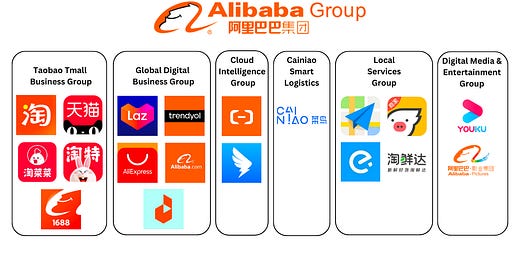Alibaba reorganized into 6 businesses, so what?
Alibaba has recently announced a reorganization, and while the explanation was not given, it is important to analyze its potential impact. To begin, let us take a closer look at the details of the reorganization.
1. Taobao Tmall Business Group
Taobao Tmall Business Group would be the core of Alibaba and has been the main revenue driver, contributing 69% of Alibaba’s revenue in FY2022.
The group encompasses a range of businesses, including Taobao, Tmall, Taobao Deals, Taocaicai, 1688.com, and more.
The newly formed Taobao Tmall Business Group will be led by CEO Trudy Dai, one of Alibaba's founding members who has been with the company since 1999. Prior to this reorganization, Dai served as the president of Alibaba's Core Domestic E-commerce division, which is closely aligned with her ‘new’ role.
2. Global Digital Business Group
The reorganization also includes Alibaba's ecommerce business outside of China, which accounted for roughly 7% of the company's revenue in FY2022. This division comprises several business units, such as Lazada, AliExpress, Trendyol, Daraz, Alibaba.com, and others.
Heading up the ecommerce business outside of China will be CEO Fan Jiang, who, while not one of Alibaba's founding members, has risen to prominence within the company. Jiang first made his mark when his startup, Umeng, was acquired by Alibaba, and he subsequently climbed the ranks to become president of Taobao and Tmall. This new role will mark a significant departure for him, as he takes on the challenge of leading the company's expansion beyond China.
3. Cloud Intelligence Group
Alibaba's cloud business was initially expected to be a key growth driver, but its growth has recently slowed to single-digit percentages in the latest quarter. Nonetheless, in FY2022, the cloud business still contributed around 9% of Alibaba's revenue.
This business unit is primarily focused on B2B operations and encompasses a range of services, such as cloud computing, AI, DingTalk, and more.
Overseeing the cloud business will be none other than Alibaba's Chairman and CEO, Daniel Zhang. This move underscores the strategic importance of the cloud unit and demonstrates the company's commitment to driving growth in this area. Zhang, who previously served as Jack Ma's second-in-command, assumed the role of Alibaba's CEO after Ma's retirement, and his expertise and leadership skills will be critical in guiding the company's cloud business forward.
4. Cainiao Smart Logistics
Alibaba's logistics unit has traditionally operated separately, and the recent reorganization is not expected to significantly alter its operations. Nevertheless, this unit remains an important part of Alibaba's business, contributing 6% to the company's revenue in FY2022. With healthy revenue growth rates in the teens, the logistics unit has been a reliable performer for the company.
Taking charge of the logistics unit is Lin Wan, who has been serving as President of Cainiao for the past six years, and previously held the position of Vice President between 2014 and 2017. Before joining Alibaba, Wan also gained valuable experience in logistics during his tenure with Amazon. With his extensive background in the industry, Wan is well-equipped to continue driving growth for the logistics unit.
5. Local Services Group
The local services unit comprises a variety of location-based services, including the mapping app Amap, food delivery service Ele.me, and several other smaller brands. In FY2022, this group accounted for 5% of Alibaba's revenue.
Leading the local services group is Yu Yongfu, who has been at the helm of this unit since assuming the role of CEO in 2021. Yongfu is a seasoned executive with a track record of success in the technology sector, having founded UC Browser before Alibaba's acquisition of his company.
6. Digital Media and Entertainment Group
The entertainment unit encompasses several platforms owned by Alibaba, including Youku and Alibaba Pictures, among others. While this group contributes the smallest portion of Alibaba's overall revenue, accounting for just 4% in FY2022, it remains an important part of the company's portfolio.
Fan Luyuan will lead the entertainment unit as CEO, bringing with him a wealth of experience in the technology and media industries. Before assuming this role, Luyuan served as CEO of Alibaba Pictures Group, where he oversaw the company's growth and expansion into new markets. Prior to that, he was part of Ant Financial Services, where he played a key role in developing innovative payment solutions such as Quick Payment and Yu'e Bao.
Old wine in new bottle?
Before the recent reorganization, Alibaba had six business segments, each of which now maps to a new group under the new structure. Although the reorganization appears to be a cosmetic change, we believe there's more to it.
Appointing a CEO for each group implies that they will operate independently, have their own profit and loss statements, and decision-making powers, much like separate companies. This approach gives each CEO more freedom in decision-making and the opportunity to shape the group's culture and values, fostering a more entrepreneurial spirit. It's not surprising that two entrepreneurs whose companies were acquired by Alibaba are now heading two of the groups. With new responsibilities, the CEOs should instill more entrepreneurial drive, while being held accountable for the results.
This move also means that the group CEOs can no longer rely on Alibaba for resources, and they must seek funding and grow independently. This is likely why the announcement mentioned that each business group can raise funds and even go public.
Spinoffs?
One major advantage of spinning off business units is that it can help a large conglomerate like Alibaba to unlock the true value of each individual business. When multiple units are combined under a single entity, it can obscure their true value and lead to a "conglomerate discount" in the eyes of investors. By spinning off individual units, each business can be valued more accurately, potentially leading to a higher market valuation overall.
Not all of the Groups have the necessary size to operate as independent listed companies, and some should remain part of the main group due to the benefits of synergy.
First and foremost, Alibaba has already confirmed that Taobao Tmall Business Group will not be spun off as a separate listed company as it is considered a crucial part of Alibaba's overall business.
The Digital Media and Entertainment Group may not be suitable for a spinoff as it consists of smaller brands that are not as strong in the market. Additionally, Alibaba Pictures, which is part of this group and already a publicly listed company, has not performed well with its share price dropping by 96% since its inception, which may not make it an attractive option for investors.
Similarly, the Local Services Group is not expected to perform well if it is spun off as a separate company. This is due to the strong competition in the market, with Meituan holding over 50% of the food delivery market share in China. While Amap is the leading map navigation app in China, Baidu Map is a close competitor. Moreover, Amap’s high utility does not necessarily translate to high revenue.
The Cloud Intelligence Group is unlikely to be spun off as it is a crucial component of the Alibaba Group and separating it could lead to complications. Additionally, the CEO may not have the bandwidth to run two companies simultaneously, making it more sensible to keep it under the main Alibaba Group.
Cainiao is the most likely group to be spun off as it has been a separate entity all along, and spinning it off would have minimal impact on the synergy within Alibaba. JD.com has also set a precedent by spinning off JD Logistics.
Another potential spinoff could be the Global Digital Business Group, following the example of Haidilao's spinoff of its international business under Super Hi. However, this decision would need to be made carefully, as the international businesses still rely on funding from the main Alibaba Group. For instance, Alibaba recently injected $913 million in September 2022 and an additional $342.5 million in December 2022 into Lazada. It may be premature to discuss spinning off the Global Digital Business Group without considering its funding requirements.
Therefore, we predict that the impact of this announcement on Alibaba will not be significant in terms of spinoffs, but rather an increase in the ownership of each business group, providing CEOs with more autonomy to drive better performance. However, it is yet to be determined if they will be successful in achieving this goal.
















